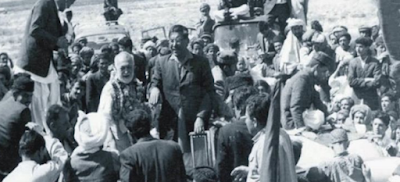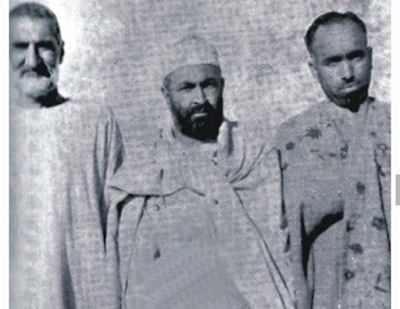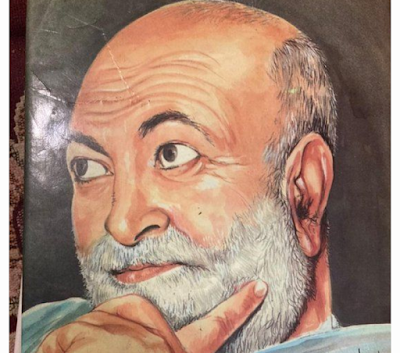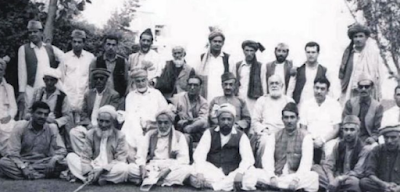Khan Abdul Samad Khan Achakzai's story I do not want a job but the freedom of my people.
 |
| Khan Abdul Samad Khan Achakzai's story freedom of my people |
The first case of Defense of India Rules in British Balochistan was against Khan Abdul Samad Khan Achakzai. Khan Abdul Samad Khan Achakzai was the first political prisoner in the history of Pakistan.
He was the only Political prisoner who spent the entire period of Ayub Khan in jail . He became the first prisoner and the last to be released.
The incident of cleaning the shoes of British soldiers at the railway station in Chaman , a border Town of Balochistan bordering Afghanistan, forced them to embark on a long struggle against slavery.
Seeing his intentions against the British rule, the British officer offered him a job and chieftaincy, but he turned it down, saying, "I don't want a job, I want the freedom of my people.
This is the story of Khan Abdul Samad Khan Achakzai, who according to researchers spent more than a third of his life in prisons. And, according to experts, no one has been able to snatch away from him the honor of being the most committed chain since the establishment of Pakistan.
His son and political successor, Mahmood Khan Achakzai , says that his father was imprisoned because of his constant struggle for the liberation of mankind from slavery, for his human and political rights and for his equal status. Couldn't really see.
He says that after regaining consciousness he had the opportunity to see his father for only six months of his life and those six months were when he was under house arrest.
 |
| Khan adbul samad khan Gharaf khan bacha khan |
Family background of Abdul Samad Khan Achakzai
Abdul Samad Khan Achakzai was born in July 1907 in his native village Inayatullah Karez in Qila Abdullah district adjoining Afghanistan.
He was the youngest of two sons of Noor Muhammad Khan Achakzai, a well known personality of the area. Abdul Samad Khan belonged to the Hamidzai branch of the Achakzai tribe of the Pashtuns.
Prof. Faizullah Panezai in his book 'Khan Shaheed Abdul Samad Khan Achakzai Personality and Scientific and Literary Services' writes that his father Noor Muhammad Khan was a famous religious scholar of the area. Abdul Samad Khan received his religious education from his father and other religious scholars.
"At the age of seven, he became familiar with Arabic and Persian. He could read Imam al-Ghazali's books in Arabic and Persian."
He was ten years old when his father died and his mother and uncles took over the responsibility of his training.
According to eminent intellectual Dr. Abdul Rauf Rafiqi, he was very intelligent and that is why he was admitted in the third class of Gulistan Middle School instead of the first.
Top in British Balochistan in scholarship examination
According to Dr. Rafiqi, Abdul Samad Khan Achakzai also proved his mettle in school. In a short span of one year and three months, he passed third and fourth class.
Mahmood Khan Achakzai said that at that time scholarship examination was taken in the fourth grade.
He said that only four students had qualified for the top position, one of whom was Khan Abdul Samad, the other was Azeem Khan, father of former secretary Farid Ahmadzai and two Sikh brothers.
He said that out of the four candidates, Abdul Samad Khan came first and started getting a monthly stipend of Rs.
According to Prof. Faizullah Khan, Gulistan Middle School was given a day off in this happiness and discussion was also arranged.
"Since he had read a lot of books, whenever a British officer or an officer from the education department came, the headmaster would present them to him and the officers would be impressed by his ability and appreciate him." But such a relationship with the British proved to be temporary.
Where did you witness the incident of cleaning the shoes of the British soldiers?
According to the well-known Pashto writer Syed Khair Mohammad Arif, when the Afghan ruler Ghazi Amanullah Khan arrived in Chaman from the Afghan province of Kandahar on December 10, 1927 to visit foreign countries, Abdul Samad Khan Achakzai was among those who received him.
Mahmood Khan Achakzai said that two incidents on this occasion greatly affected his father.
He says it was raining at the Chaman railway station when British soldiers came to present Ghazi Amanullah Khan with a guard of honor. This incident raised them to fight against slavery.
He says that at that time, Abdul Samad Khan said that it should have happened that those who saluted Amanullah Khan were Pashtuns here. If there were no Pashtuns, at least they would be Indians, but they were Indians, but they were cleaning the shoes of the British soldiers.
Mahmood Khan Achakzai said that he had been restless for several days due to this incident.
According to Khair Mohammad Arif, the people who came there were saddened by the chaos and disorder. Due to which Amanullah Khan could not speak. Abdul Samad Khan kept thinking for many days how this situation can be cured.
He led a procession against the British while still in school
Khair Mohammad Arif says that Abdul Samad Khan was one of the foremost leaders in the Indian subcontinent. He was an intelligent and resourceful politician who fought against British imperialism and its exploitative system till the last breath of his life to free his people from slavery.
"Abdul Samad led a procession expelled from school in 1918 during his student days, which shows his political consciousness and future intentions," he says.
Khair Mohammad Arif says that Abdul Samad Khan writes that when Amanullah Khan declared war on the British for complete independence. So many of our people were going to fight in Afghanistan, which impressed me a lot.
According to Khair Muhammad Arif, Abdul Samad Khan was deeply disturbed by all the incidents that took place. Highlighted
Mahmood Khan Achakzai said, “Abdul Samad Khan decided that they would gather in the mosque of the area and think about their activities from here.
"But the British intelligence system was so fast that after finding out, a British officer went to Gulistan specifically to warn them and later he was punished for these activities."
Meeting with Gandhi
Khair Muhammad Arif says that in July 1931, Abdul Samad Khan left for India. On August 2, 1931, he met Gandhi in Ahmedabad. And decided to go to Mumbai with Gandhi at his invitation.
According to Khair Muhammad Arif, Abdul Samad Khan stayed with Gandhi for 15 days during his visit to Mumbai on August 3. And met with many political leaders of India and apprised them of the barbarism of the British and the deprivations of the people in Balochistan.
According to Khair Muhammad Arif, "It is a strange coincidence that Abdul Samad Khan and Khan Abdul Ghaffar Khan alias Bacha Khan first met at Gandhi's house in Mumbai which later turned into the longest friendship."
'Gandhi's surprise at wearing Khaddar'
Mahmood Khan Achakzai says that during his meetings with Gandhi and his meetings there, Khan Abdul Samad decided to wear khaddar as khaddar had become a symbol of opposition during the British rule.
He said, "When Gandhi saw them in khaddar, he was surprised and told them that if you wear khaddar as per one's wish, you will take it off tomorrow as per their wish."
Mahmood Khan Achakzai says that his father told him that he wore khaddar only of his own free will. After that he continued to wear khaddar all his life.
Although he was arrested for his struggle against British rule even before his meetings with Gandhi and the Congress leaders there, his arrests increased after these meetings.
How many times were they arrested in total and how did they react to the second arrest?
According to author and scholar Prof. Shaukat Tareen, Abdul Samad Khan Achakzai was arrested for the first time in his life in April 1929 in Quetta, along with 15 members of his family, while trying to go to Afghanistan to help Ghazi Amanullah Khan.
He says that at the time of Abdul Samad Khan's second arrest on May 16, 1930, he was accused of interpreting the holy verses of the Qur'an after Taraweeh prayers in the month of Ramadan. This time Wingate, a British political agent, went to Gulistan himself to warn him.
On July 25, 1930, he was sentenced to two years rigorous imprisonment in the Sandeman Jirga Hall, Quetta. Meanwhile, three British men and a woman were abducted on June 4, 1930 in retaliation for their arrest, but were held in high esteem by their captors.
Professor Shaukat Tareen says that Abdul Samad Khan was arrested a total of 11 times in his life.
"He was arrested five times during the British rule and six times after the establishment of Pakistan."
 |
| Khan abdul samad khan |
The first political prisoner in the history of Pakistan
According to Professor Shaukat Tareen, Abdul Samad Khan Achakzai was the first political prisoner to be convicted under FCR in British Balochistan.
He says that the first case of Defense of India Rules in British Balochistan was against Khan Abdul Samad Khan Achakzai. Khan Abdul Samad Khan Achakzai was the first political prisoner in the history of Pakistan. I spent He became the first prisoner and the last to be released.
Shaukat Tareen says that Abdul Samad Khan was sentenced to more than 35 years in different periods but either the charges were not proved or he was given exemption under the prevailing laws. He spent 22 years, one month and 21 days in jail. Which was 33% of his 66 years of life.
He said that it was a unique record for any political leader to spend 33% of his life in jail.
He studied in jail till graduation
He was arrested on 10 October 1958 during the Aubrey Martial Law after Partition of India. After a short trial on 24 June, the verdict was reserved on 4 November and on 8 December 1958 he was sentenced by a special military court to 14 years rigorous imprisonment.
According to intellectual and research engineer Malik Asad Khan Tareen, Abdul Samad Khan passed eight exams while in jail. Pashto Literature and Fazil Persian Writer Fazil etc. and then passed FA and BA in English.
Khan Abdul Samad writes in his autobiography: "During my imprisonment I asked a British officer to provide me with books to read in prison. He told me that according to the law in prison you can only be given two books but some religious books." I asked my older brother to provide the books. '
He received an overall four-year sentence reduction due to his prison education.
Offer of British job before establishment of Pakistan and later governorship
Prof. Faizullah Khan Panezai writes in his book that when the British felt that Abdul Samad Khan Achakzai could not be suppressed, they offered him to become the leader of Achakzai tribe of Pashtun nation.
Rejecting the offer, he said, "I am the son of a poor widow of Gulistan and do not want to be a Sardar."
In 1937, Colonel Shah offered him the post of Assistant Commissioner and he turned down the offer so that he could continue his struggle for independence of his land.
Prominent scholar Prof. Abdul Ghani Khan Ghanu, quoting Abdul Karim Baryalai in his book Baba Pashtun and Volume III of Pashtunkhwa, writes that the federal government offered to make him governor in the early 70's.
After consulting his colleagues, he said, "I have decided not to accept the governorship because there is a rift between the central government and the Baloch. There will be civil war and bombing and the Baloch will be searched. I do not want to be a party to the war between the Balochs and I do not want to be involved in disrespecting any nation so I want to turn down this offer.
 |
| Prof. Abdul Ghani, quoting Baba Pashtun and Abdul Sadiq Achakzai in Pashtunkhwa, wrote, “In 1958 |
'When Baba was handcuffed, we children started crying'
Prof. Abdul Ghani, quoting Baba Pashtun and Abdul Sadiq Achakzai in Pashtunkhwa, wrote, “In 1958, Baba was on trial in a martial law court in Quetta. There was a Major in the present Municipal Corporation Quetta building. Maulvi Mahmood was a lower rank officer and a civil judge. We also used to come to every hearing. We were standing next to the children and we started crying. Baba came to us and turned his hand on his head and said don't be upset. There will be such sufferings. I am used to them, I have been in the prison of their masters (British) for a long time. That prison was much better than this freedom.
Abdul Samad Khan Achakzai as a writer and journalist
Engineer Malik Asad Khan Tareen Khan says that Abdul Samad's writings have all the features that a good prose writer should have.
According to a literary history, Khan Abdul Samad Khan translated Ghazali's Alchemy of Happiness, Shibli Nomani's Sira-e-Pak, and Abu Kalam Azad's Translator of the Qur'an, Sheikh Saadi's 'Gulistan' and 'Future of Freedom' into Pashto and Urdu.
He was also a journalist. He laid the foundation of journalism in the province and got the title of father of journalism in the province. In 1938, Istiqlal newspaper was launched. The paper continued to be published for about 12 years, but in 1950 the government banned its publication. After that, Khan Abdul Samad launched the weekly 'Paigham Jadeed' and later the Pashto magazine, but the government also banned it. After which he launched the Pashto magazine Gulistan and thus he continued to perform his duty of guiding his nation.
Collected donations and set up a printing press
According to Khair Muhammad Arif, the government enacted the Press Act in 1936 in Balochistan as well. Due to unavailability of resources, setting up a press here was a difficult step.
Therefore, Abdul Samad Khan collected donations to fulfill this national duty. He then set up a press and named it after his colleague and freedom fighter Yousuf Aziz Magsi.
After launching the press, he was the first to launch the weekly Istiqlal in Urdu and Pashto. He believed that freedom of expression was a basic human right which required the media.
Attempt to adapt life to Allama Iqbal's poem
According to Dr. Raf Rafiqi, Abdul Samad Khan writes on page 151 and page 152 of the first volume of his autobiography, referring to Gulistan Cornicular Middle School student: I remembered the child's prayer. For many years I used to repeat this prayer twice a day to find its effects in my life. And the second sentence that my senior students asked me to spell to test my aptitude was: 'Being a well-known speaker is as important as cleanliness as a mirror'. I'm sure if these two things hadn't happened to me, I wouldn't be who I am now. "
How did khan abdul samad khan murder happen?
Khan Abdul Samad Khan was a great leader but he did not have a personal bodyguard and simplicity remained his motto.
Professor Faizullah, quoting a study by Professor Sami Naghmana, former chairperson of the Department of Communication at the University of Balochistan, writes: At no point did he resort to violence.
"They have always been without weapons and bodyguards," she wrote. He used to walk from his house to Jinnah Road every evening and mingle with ordinary people in the corner of Farah Hotel. He would talk to his friends and people would listen to his laughter.
He was killed in the dark of night and for this purpose he was attacked with grenades while sleeping in this small house on the night of December 2, 1973.
Mahmood Khan Achakzai says that although Abdul Samad Khan was out of jail for the last two years of his life, his mission was to fight for the welfare of the people.








0 Comments